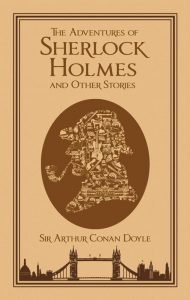 Literature’s most famous sleuth has so penetrated the popular imagination that few people first encounter him in his original form, as envisioned nearly 150 years ago by Sir Arthur Conan Doyle. Radio, film and television adaptations of the Holmes stories abound, often offering drastically different interpretations of the character. Even the famous image of Holmes, adorned with a cape and deerstalker cap, owes more to Sidney Edward Paget, the original illustrator of the Holmes stories, and William Gillette, the first man to direct a stage version of the stories, than to Conan Doyle. As if that weren’t enough, numerous authors have added to the Holmes omnibus over the years, from Anthony Burgess and P.G. Wodehouse to A.A. Milne and Stephen King, so there are certainly far more extant interpretations of Sherlock Holmes the four novels and 50-odd stories produced by Sir Arthur Conan Doyle.
Literature’s most famous sleuth has so penetrated the popular imagination that few people first encounter him in his original form, as envisioned nearly 150 years ago by Sir Arthur Conan Doyle. Radio, film and television adaptations of the Holmes stories abound, often offering drastically different interpretations of the character. Even the famous image of Holmes, adorned with a cape and deerstalker cap, owes more to Sidney Edward Paget, the original illustrator of the Holmes stories, and William Gillette, the first man to direct a stage version of the stories, than to Conan Doyle. As if that weren’t enough, numerous authors have added to the Holmes omnibus over the years, from Anthony Burgess and P.G. Wodehouse to A.A. Milne and Stephen King, so there are certainly far more extant interpretations of Sherlock Holmes the four novels and 50-odd stories produced by Sir Arthur Conan Doyle.
The undying popularity of Sherlock Holmes testifies to the appeal of Doyle’s creation, but it also makes it easy to lose sight of the original character, whose quirks and contradictions form the basis of his charm. Holmes is, at bottom, a rationalist, someone who affects disdain for the heroic role his friend and chronicler, John Watson, has thrust him in: “If I claim full justice for my art, it is because it is an impersonal thing – a thing beyond myself. Crime is common. Logic is rare. Therefore it is upon the logic rather than upon the crime that you should dwell. You have degraded what should have been a course of lectures into a series of tales.” But Sherlock Holmes is also something of a hunter. He gets restless when he has no great mystery to fixate upon, and frequently bemoans the lack of a worthy adversary: “[…] the days of the great cases are past. Man, or at least criminal man, has lost all enterprise and originality.” He frequently evinces a kind of respect for his more clever criminal opponents, and shows no interest in justice or retribution if the crime in question is petty or uninteresting. “My life,” he says at one point, “is spent in one long effort to escape from the commonplaces of existence,” and we as readers do not doubt his sincerity, for when he is not in pursuit of a criminal, his restless intelligence finds some other esoteric subject to fixate upon – ballistics, say, or botany – and, when all else fails, he turns to drugs: cocaine, or morphine, or occasionally opium.
Holmes, it must also be said, embodies the spirit of scientific optimism, and has perhaps been fiction’s most successful ambassador for reason and logic since his creation. “Data! Data! Data! I can’t make bricks without clay!” is his succinct appeal to evidence-based reasoning, and his continual insistence that “What one man can invent another can discover” is the foundational ethos of criminology. And yet here he is, in a moment of quiet, appreciating the beauty of flowers: “Our highest assurance of the goodness of Providence seems to me to rest in the flowers. All other things, our powers, our desires, our food, are really necessary for our existence in the first instance. But this rose is an extra. Its smell and its colour are an embellishment of life, not a condition of it. It is only goodness which gives extras, and so I say again that we have much to hope from flowers.” I have watched many an adaptation of Arthur Conan Doyle’s original Sherlock Holmes, but none have offered anything like this cheery reflection; for that, we need the original.